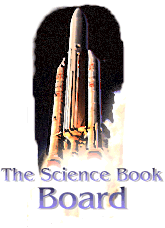|
 You can purchase this book clicking
here. You can purchase this book clicking
here.
If you wish to purchase further titles already reviewed
here, please return each time to SBB. Using the direct links available at our site is easier than
searching by title, author, or ISBN number.

EDITORIAL INFORMATION
The 1999 Astrodynamics Conference was hosted by the
American Astronautical Society (AAS) and co-sponsored by the American
Institute of Aeronautics and Astronautics (AIAA). The conference was held
August 16-19, 1999, at the Westin Alyeska Prince Hotel, Girdwood, Alaska.
There were some 156 papers presented in 21 technical sessions. These
astrodynamics conferences have been held annually since the mid-1960s,
managed alternatively by the AAS and the AIAA. Every second year the AAS
publishes the proceedings. Astrodynamics 1999, Volume 103, Advances in
the Astronautical Sciences, consists of three parts totaling about 2720
pages. All of the available papers appear in full in Volume 103..
(Extracted from the Foreword).

GENERAL TABLE OF CONTENTS
- -Foreword.
- -Preface.
- -Contents.
- -Part II:
- -Orbit Determination.
- -Analysis for the Selection of Data Source in the
Orbit Determination Process.
-A Fresh Look at Angles-Only Orbit Determination.
-Low Orbits Estimation From a Single Ground Station.
-Performance of a Dynamic Algorithm for Processing Uncorrelated Tracks.
-The Naval Space Command Automatic Differential Correction Process.
-A New Approach to GPS Carrier Phase Ambiguity Resolution.
-Automated Tuning of an Extended Kalman Filter Using the Downhill
Simplex Algorithm.
-Altitude Effects on Autonomous Orbit Determination.
- -Attitude Dynamics and Control: Applications.
- -Flight Control Overview of STS-88, The First Space
Station Assembly Flight.
-Space Station Attitude Control During Payload Operations.
-GOES On-Orbit Storage Mode Attitude Dynamics and Control.
-ICESat Attitude Algorithm For Maintained Reference Groundtrack
Pointing.
-Autonomous Control of the PROBA Spacecraft.
-Integrated Structural and Control Optimization of a Large Space
Structure Using Analytical Sensitivity Analysis.
-Comparison of Melnikov's Method and Numerical Simulation for Predicting
Nonlinear Dynamics in the Pitch Motion of Actively Controlled Satellites
in a Gravity Gradient Field.
-ATTDES - Generalized Equations of Motion.
- -Atmopsheric Modeling.
- -Solar Cycle Effects on Thermospheric Density and
Satellite Drag.
-Atmospheric Density, Solar Activity, and Spacecraft/Satellite
Characteristics: An Integrated Relationship for Orbital Lifetime
Prediction Assesment.
-Satellite Drag Accuracy Improvements From Neutral Density Model
Calibration.
-A Methodology for Using Optimal MSIS Parameters Retrieved From SSULI
Data to Compute Satellite Drag on LEO Objects.
-Neutral Atmosphere Density Monitoring Based on Space Surveillance
System Orbital Data.
-Calibration of Semi-Empirical Atmosphere Models Through the Orbital
Decay of Spherical Satellites.
-Satellite Drag Accuracy Improvements Estimated From Orbital Energy
Dissipation Rates.
-Utilization of Mars Global Surveyor Accelerometer Data for Atmospheric
Modeling.
- -Stationkeeping and Proximity Operations.
- -An Operational Approach for Generating
Near-Optimal Station Keeping Strategies Via Parallel Genetic Algorithms.
-A Practical Stationkeeping Method for Modular Geosynchronous Satellites
With Xenon Propulsion System.
-Impact of Eccentricity on East.West Stationkeeping for the GPS Class of
Orbits.
-Earth-Centered Angle Station-Keeping in Low-Earth Orbits With
Yaw-Steering Constraints.
-Maintenance of the ICESat Exact Repeat Ground Track.
-Close Approach Spacecraft Maneuver Criterion.
-Contingency ISS Rendezvous Recovery Planning by Houston and Moscow
Control Centers.
- -Mission Design: Near Earth, Earth/Moon, and
Libration Points.
- -Mission Planning for the Chandra X-Ray
Observatory.
-System Design Considerations for a Formosa-X Microsatellite.
-The Lunar Prospector Mission: Results of Trajectory Design,
Quasi-Frozen Orbits, Extended Mission Targeting, and Lunar Topography
and Potential Models.
-Genesis Trajectory Design.
-Maneuver Design and Calibration for the Genesis Spacecraft.
-Triana Mission Design.
-Optimization of Insertion Cost for Transfer Trajectories to Libration
Point Orbits.
- -Trajectory Optimization.
- -Numerical Research in Non-Coplanar Orbital
Maneuvers.
-Thrust Programming in Aeroassisted Maneuvers.
-The Optimization of Continous Constant Acceleration Transfer
Trajectories in the Presence of the J2 Perturbation.
-Necessary and Sufficient Conditions for Optimal Impulsive Rendezvous
and Linear Equations of Motions.
-Optimal, Low-Thrust LEO to GEO/HEO Trajectories.
-Optimal Earth-gravity-Assist Trajectories in the Restricted Three-Body
Problem.
-Low-Thrust Control Law Development for Transfer From Low Earth Orbits
to High Energy Elliptical Parking Orbits.
- -Tethers.
- -Altitude Control of a
Tethered Lifting Probe for Atmospheric Research.
-Improved Tether Aerobraking Maneuvres Using a Lifting Probe.
-Advanced Tether Experiment Deployment Failure.
-A Study of the Planar Deployment Dynamics of the ASTOR Tethered
Satellite System.
-A Look at Tethered Satellite Identification Using Ridge-Type Estimation
Methods.
-Modeling Tethered Satellite Systems for Detection and Orbit
Determination.
-Tracking of the TiPS Tethered Satellite System.
|
![]()

![]()